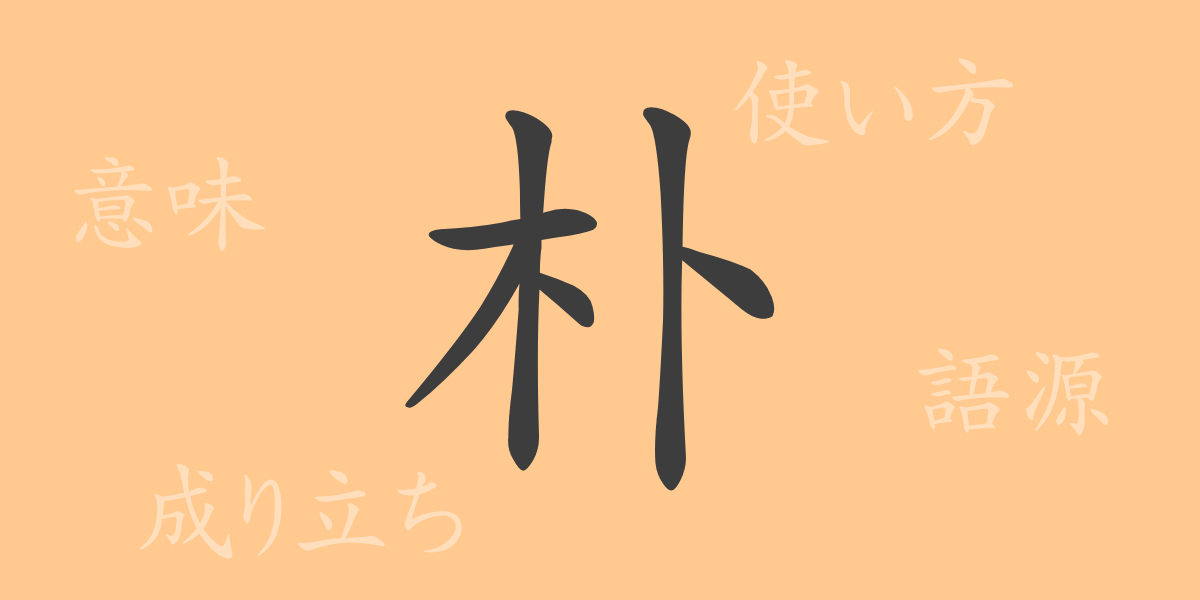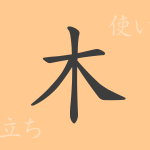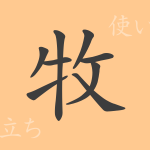Japanese script culture is profound, and among its many facets, 常用漢字 (じょうようかんじ, Jōyō Kanji) are deeply intertwined with daily life. Today, we spotlight one such 常用漢字 (じょうようかんじ, Jōyō Kanji), “朴 (ぼく, Boku).” We’ll delve into its origins, meanings, usage, and even explore idioms and proverbs associated with it. Let’s step into the intricate world of this simple yet profound kanji together.
The Origins of 朴 (ぼく, Boku)
The kanji “朴 (ぼく, Boku)” is formed by combining the radical for “tree” (木, き, Ki) with the component for “white” (白, はく, Haku). This combination falls into the category of “形声文字 (けいせいもじ, Keisei Moji),” which are characters where one part indicates the meaning (木, き, Ki) and the other part suggests the pronunciation (白, はく, Haku). Historically, it was used to describe the simple quality of wood, but over time, its usage has expanded to encompass various meanings.
Meanings and Usage of 朴 (ぼく, Boku)
The kanji “朴 (ぼく, Boku)” conveys meanings such as simplicity, plainness, and unadorned. It is often used in expressions that describe straightforward and unpretentious character traits, such as “朴訥 (ぼくとつ, Bokutotsu)” and “朴直 (ぼくちょく, Bokuchoku).” Additionally, it is known as the name of a tree, the “Magnolia” (ホオノキ, ほおのき, Hōnoki), and thus appears in discussions related to nature and the environment.
Readings, Stroke Count, and Radical of 朴 (ぼく, Boku)
The kanji “朴 (ぼく, Boku)” has multiple readings in Japanese.
- Readings: The on’yomi (音読み, おんよみ) is “ボク (Boku),” and the kun’yomi (訓読み, くんよみ) is “ほお (Hō).”
- Stroke Count: The kanji “朴 (ぼく, Boku)” consists of 8 strokes.
- Radical: The radical is 木偏 (きへん, Kihen), also known as the “tree radical.”
Idioms, Proverbs, and Expressions Using 朴 (ぼく, Boku)
Here are some idioms, proverbs, and expressions that include the kanji “朴 (ぼく, Boku)”:
- 朴訥 (ぼくとつ, Bokutotsu): Describes someone simple and of few words.
- 朴直 (ぼくちょく, Bokuchoku): Refers to a straightforward and unpretentious personality.
- 朴念仁 (ぼくねんじん, Bokunenjin): Indicates a simple person who does not complain.
- 朴刀一閃 (ぼくとういっせん, Bokutō Issen): Literally means a single slash of a simple yet sharp blade, often used to describe a straightforward but effective action.
Conclusion on 朴 (ぼく, Boku)
The kanji “朴 (ぼく, Boku)” holds a wealth of meanings that belie its simple appearance. As a word representing simplicity and plainness, or as a term for the Magnolia tree, it has been cherished in our language. Through this article, we hope you have gained an appreciation for the history and cultural background of “朴 (ぼく, Boku)” and continue to enjoy the rich nuances of the Japanese language.

























